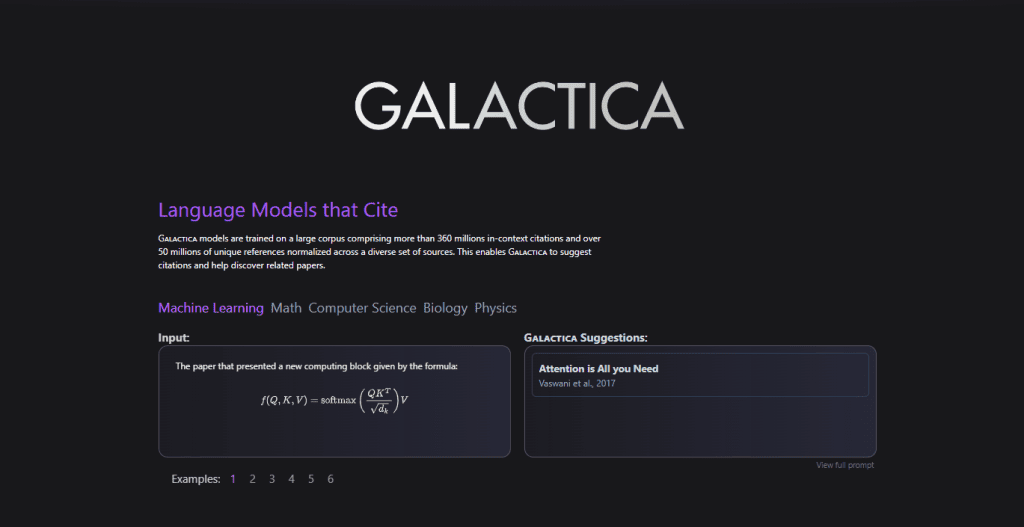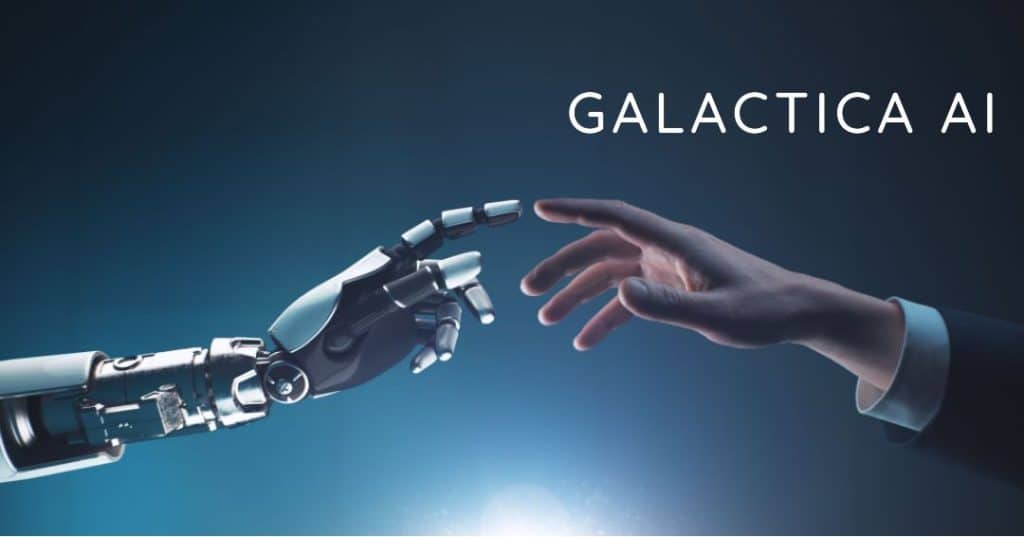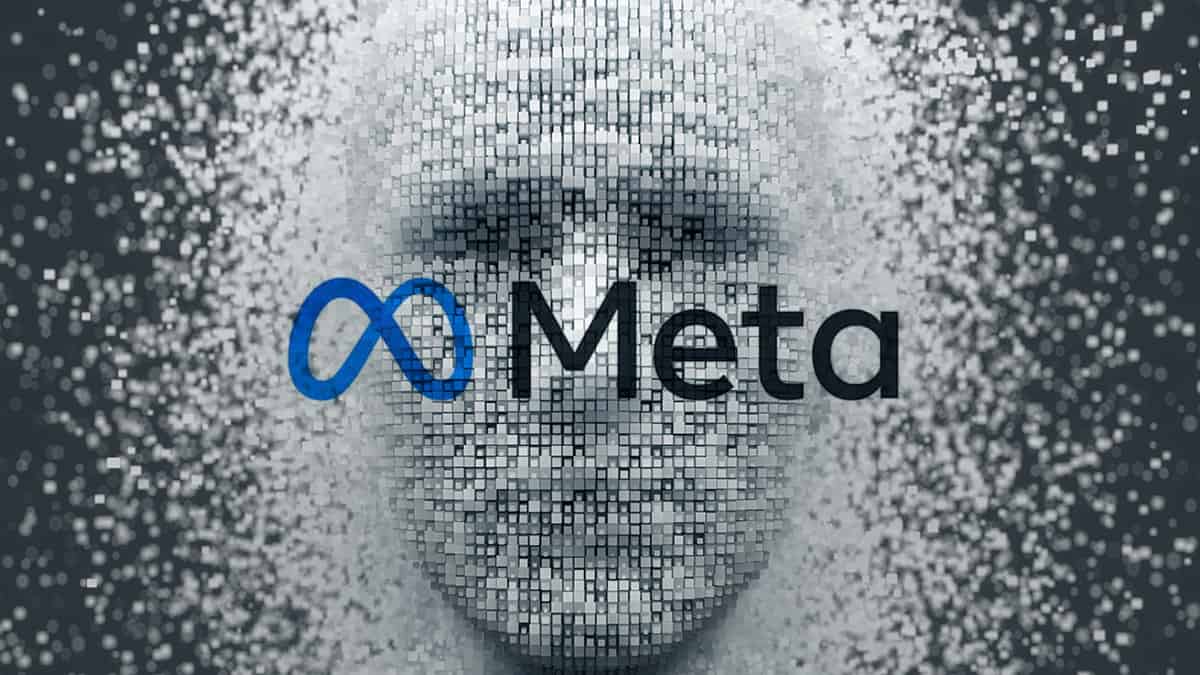Introduction: The Dawn of Galactica
In the ever-evolving landscape of artificial intelligence, Meta (formerly known as Facebook 2.0) has unveiled a groundbreaking innovation: Galactica. This AI model is not merely an incremental improvement; it represents a paradigm shift in AI-driven scientific research. Galactica’s capabilities extend beyond the conventional, offering the ability to generate science-related articles with an unprecedented level of detail and precision, complete with citations. Furthermore, it can perform intricate mathematical calculations and provide comprehensive explanations, making it an invaluable tool for the scientific community.
Galactica: A Revolution in Scientific Literature Generation
Galactica is not just an AI model; it’s a scientific companion. It is designed to generate science-related articles, complete with citations, making it a valuable asset for researchers, scientists, and enthusiasts alike. The model’s ability to perform mathematical calculations and provide detailed explanations further cements its position as a revolutionary tool in the scientific community.
A[Galactica] -- Generates --> B[Science-related articles]
A -- Performs --> C[Mathematical calculations]
A -- Provides --> D[Detailed explanations]The Underlying Architecture of Galactica
The power of Galactica lies in its massive parameter count. With 120 billion parameters, Galactica is one of the most complex AI models to date. This vast number of parameters allows Galactica to understand and generate complex scientific content with an unparalleled level of detail and accuracy. The model’s ability to generate citations further enhances its utility, making it an invaluable tool for scientific research and exploration.
Galactica: A New Era in AI-Driven Science
The introduction of Galactica marks a significant milestone in the journey of AI. Its ability to generate detailed science-related articles and perform complex mathematical calculations positions it as a powerful tool for the future. As we continue to explore the vast expanse of scientific knowledge, tools like Galactica will play a crucial role in shaping our understanding of the universe.

Galactica: A Deep Dive into its Capabilities
Galactica’s capabilities extend beyond mere text generation. It is equipped with the ability to perform complex mathematical calculations, a feature that sets it apart from other AI models. This capability, coupled with its ability to provide detailed explanations, makes Galactica a powerful tool for scientific exploration. Whether it’s solving intricate equations or explaining complex scientific concepts, Galactica is designed to assist researchers in their quest for knowledge.
1. Image and Video Recognition
The platform incorporates state-of-the-art computer vision techniques, allowing it to understand and interpret visual data. Galactia AI can analyze images and videos, recognize objects, detect faces, and even classify content based on specific criteria. This capability has numerous applications, including autonomous vehicles, surveillance systems, and content moderation.
2. Predictive Analytics
Galactia AI leverages its powerful machine learning algorithms to perform predictive analytics. By analyzing historical data and identifying patterns, it can generate accurate forecasts and predictions. This functionality can be used in various fields, such as financial forecasting, demand prediction, and risk assessment.
3. Personalized Recommendations
The AI platform employs advanced recommendation algorithms to provide personalized suggestions and recommendations. By understanding user preferences and behavior, Galactia AI can deliver tailored recommendations, enhancing user experiences in areas like e-commerce, entertainment, and content consumption.
The Impact of Galactica on Scientific Research
The advent of Galactica has the potential to revolutionize the field of scientific research. Its ability to generate detailed, citation-rich articles can significantly streamline the research process, allowing scientists to focus on innovation and discovery. Furthermore, Galactica’s ability to perform complex mathematical calculations and provide comprehensive explanations can enhance understanding and facilitate knowledge transfer in the scientific community

Galactica’s performance on a range of scientific tasks is unparalleled. On technical knowledge probes such as LaTeX equations, Galactica outperforms the latest GPT-3 by 68.2% versus 49.0%. It also excels in reasoning, outperforming Chinchilla on mathematical MMLU by 41.3% to 35.7%, and PaLM 540B on MATH with a score of 20.4% versus 8.8%. It sets a new state-of-the-art on downstream tasks such as PubMedQA and MedMCQA dev of 77.6% and 52.9%. Even without being trained on a general corpus, Galactica outperforms BLOOM and OPT-175B on BIG-bench. And these might be just a figure for you but on actual bench mark results they are quite impressive in comparison to the achievements of Deep ML languages
A year spent in artificial intelligence is enough to make one believe in God.
Step-by-Step Reasoning
One of the most innovative features of Galactica is its ability to perform step-by-step reasoning using a clever encoding of intermediate steps. This allows it to solve complex problems in a systematic and logical manner, mimicking the way a human scientist would approach a problem.
Galactica also has the ability to model scientific references and citations, making it an invaluable tool for researchers. It can predict which papers are likely to be relevant to a given topic, helping researchers navigate the vast landscape of scientific literature.
The Future of Science with Galactica
Galactica represents a new era in scientific research. It is not just a tool for scientists, but a partner that can help them navigate the vast ocean of scientific knowledge. With Galactica, researchers can ask scientific questions, explore the literature, write scientific code, and much more. It is a powerful ally in the quest for scientific discovery.
Unusual Capabilities
Galactica AI has demonstrated impressive capabilities in reasoning and knowledge-intensive scientific tasks. For example, it significantly exceeds the performance of general language models such as the latest GPT-3 in tasks like LaTeX equations. It also performs well in downstream scientific tasks, setting a new state-of-the-art on several downstream tasks such as PubMedQA and MedMCQA dev.
Moreover, Galactica AI can perform multi-modal tasks involving SMILES chemical formulas and protein sequences. It can formulate drug discovery tasks as text prompts and show performance scales in a weakly supervised setup. It can also annotate protein sequences with natural language, including predicting functional keywords.

Fine-Tuning and Remodeling
Galactica AI’s fine-tuning and remodeling capabilities are evident in its ability to absorb scientific knowledge and improve smoothly with scale. It uses task-specific tokens to support different types of knowledge, processing citations with a special token that allows a researcher to predict a citation given any input context. It also wraps step-by-step reasoning in a special token, mimicking an internal working memory.
Here is an example of how Galactica AI uses a working memory token, <work>, to perform step-by-step reasoning:
pythonCopy code .py
#Question: A needle 35 mm long rests on a water surface at 20◦C. What force over and above the needle’s weight is required to lift the needle from contact with the water surface? σ= 0.0728m.
<work>
σ= 0.0728 N /m
σ=F/L
0.0728 = F/(2×0.035)
F= 0.0728(2 ×0.035)
calculate.py
‘‘‘
f = 0.0728*(2*0.035)
with open("output.txt", "w") as file:
file.write(str(round(f, 5)))
‘‘‘
«run: "calculate.py"»
«read: "output.txt"»
0.0051
</work>
Answer: F= 0.0051 N
In this example, Galactica AI uses the <work> token to perform step-by-step reasoning for a physics problem. When it reaches a calculation that it cannot solve reliably in a single forward-pass, it writes a Python script, which can
Real Life Benifits of Galactia AI
Let’s Summarize some scenarios where Galactica AI could be used in the development of the mankind
Scientific Research
Consider a climate scientist studying the impact of greenhouse gases on global temperatures. The sheer volume of research in this field can be overwhelming. With Galactica AI, the scientist could ask for a summary of all studies published in the last year that used a specific climate model. This would allow them to stay up-to-date with the latest research and understand how their work fits into the broader scientific context.
# Ask Galactica AI for a summary of recent research
query = "Summarize all studies published in the last year using the XYZ climate model."
response = galactica.generate(query)
print(response)Novel Drug Discovery
In the fight against COVID-19, researchers worldwide were racing to find effective treatments. Galactica AI could have been used to predict potential drug candidates based on the structure of the SARS-CoV-2 virus. By generating a list of molecules that could bind to the virus and inhibit its function, Galactica AI could have significantly sped up the initial stages of drug discovery.
#Ask Galactica AI to predict potential drug candidates
query = "Generate a list of molecules that could bind to the SARS-CoV-2 spike protein."
response = galactica.generate(query)
print(response)Future Education & Academic Process
Imagine a high school student preparing for their final exam in chemistry. They’re struggling with the concept of acid-base reactions. With Galactica AI, they could ask for a step-by-step explanation of how these reactions work, complete with examples and diagrams. This personalized tutoring could help the student grasp the concept more effectively and perform better on their exam.
Scientific Learning
A team of astronomers have made a groundbreaking discovery: they’ve detected signs of water on a distant exoplanet. They need to publish their findings quickly to secure their claim. Using Galactica AI, they could generate a first draft of their paper, including the methods they used to detect the water and the potential implications of their discovery. This would allow them to publish their findings more quickly and communicate their discovery to the world.
DATA Analytics & Algorithm
A geneticist is studying the genetic basis of a rare disease. They have sequenced the genomes of hundreds of patients and are looking for mutations that could be causing the disease. With Galactica AI, they could analyze their data and identify patterns, such as a specific gene that is mutated in a high percentage of patients. This could lead to a better understanding of the disease and potentially pave the way for the development of a targeted treatment.
# Ask Galactica AI to analyze genetic data and identify patterns
query = "Analyze the attached genetic data and identify any genes that are frequently mutated in patients with disease XYZ."
response = galactica.generate(query, attachment=genetic_data)
print(response)These examples illustrate the potential of Galactica AI to revolutionize various aspects of science, from research and drug discovery to education and scientific communication. As we continue to explore and develop this technology, we can expect to see even more innovative and impactful applications.
Conclusion
Galactica AI represents a significant advancement in the field of AI and machine learning. Its ability to store, combine, and reason about scientific knowledge offers immense potential for various scientific tasks. Its unique capabilities, such as performing multi-modal tasks and fine-tuning and remodeling, set it apart from other large language models. As we continue to explore the capabilities of Galactica AI, we can expect to see even more exciting developments in the field of AI and science.

